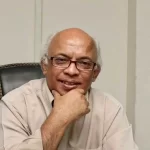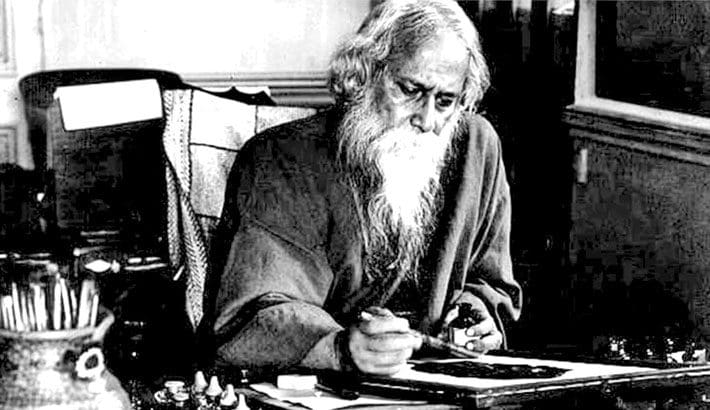My first encounter with Rabindranath Tagore was on a cold winter’s day in early 1964. He was there as a sketch in pencil, on the mantelpiece of a Bengali home in Quetta. The flowing beard, the penetrating eyes, that sense of gravitas – all of this came alive in that sketch. I asked the host, a colleague of my father’s, who the gentleman was in the sketch. A great man, said he. He is Rabindranath Tagore, a poet. Young as I was, in primary school, I asked no more questions.
That was a long time ago. Between then and now, I have known Rabindranath or think I have known him, fundamentally through his songs. In the dark days of 1971, when monsoon showers added to the gloom of an enemy-occupied Dhaka, it was the poet’s ‘Amar Shonar Bangla’ that I heard day after day on Shwadhin Bangla Betar, making sure that no Pakistani soldiers were on the prowl, that no one who looked suspiciously like a quisling was around.
In the midst of that twilight struggle, I knew that Rabindranath was contraband item in genocide-driven East Pakistan. Some months later, with Bangladesh having taken birth, I came to know a little more of the poet, came to hear of the courage a few Bengali men and women had demonstrated in observing the centenary of his birth in 1961. The term Chhayanaut took on a note of familiarity.
My education in Rabindranath has gone on. There are some ideas that keep growing, keep taking newer shape, keep enriching human experience. When on a spring day in the mid-1970s my neighbour in Wari played ‘tomaaye gaan shonabo’ on his long-playing record, in Hemanta Mukherjee’s voice, I knew I had to learn that song. I did, within weeks.
And I have sung that song since then. And I have heard many others. But, then, I ask myself if my understanding of Rabindranath or indeed my ever closer encounters with him would be what they are today had Waheedul Haque not let me in on the wider world of Tagore philosophy.
Every rickshaw ride with Waheed Bhai, all the way from the offices of the New Nation and to the university area, was a new lesson in Rabindranath. It was that dark period in life when military autocracy ran wild, in the early 1980s; and Waheed Bhai, one of those intrepid souls behind the 1961 celebrations, invariably sang ‘ekhono gelo na aandhar / ekhono roilo baadha.’ The symbolism was all.
That Rabindranath Tagore remains, and will remain, our strongest hold on history comes through the many layers of thought his personality was made of. He was a poet. He composed songs which brought into their melody all the pains and pleasures we associate with living. His fiction was a portrayal of life in all its lucidity of meaning. His paintings were images of Bengal. There was the Renaissance man in him, the likes of whom we have not quite spotted in Bengali life of late.
On his travels in China in the 1920s, he deftly deflected every insinuation of his poetry being weighed down by colonial dominance. Yet he knew that politics could not be separated from literature, that poetry could be a potent weapon against political chicanery. It was his pain, every Bengali’s agony, that rose as a loud cry unto the heavens when the British colonial power drove a knife through the heart of the land and called it the partition of Bengal. That was in 1905.
Bengal was to be reunited and then segmented once more, in 1947. The cracked heart thus sings on . . . ‘o amar desher mati / tomar pore thekai matha’.
It is the deeply religious, a resurgence of faith, a spirituality encompassing the heart and embracing the soul that I have spotted in Rabindranath. Could any invocation to God, any admission of guilt consequent upon a commission of sin, be higher than the forever moving ‘amar hiya’r majhe lukiye chhile / dekhte aami paaini tomaaye’?
Deep in the nocturnal hours, even as the rain falls in rhythm on the trembling leaves of the pastoral trees, something of the power of Creation wells up in the soul. In ‘tumi daak diyechho kon shokaale / keu ta jaane na’ comes an acknowledgement of your limitations, of your inability to identify with the divine.
Rabindranath’s modernity, in these post-modern times, sends out spasms of romance into your being. His interaction with Victoria Ocampo in Argentina, his friendship with William Butler Yeats and his conversations with Albert Einstein give off a sure idea of how far he was ahead of most of his countrymen in his approach to life and the philosophies it came entwined in.
His Shantiniketan conversations with Mahatma Gandhi, with Sher-e-Bangla AK Fazlul Huq were those rare moments in history when nations are privy to a presence of the great and the glorious. History often comes in the form of miracles. Rabindranath lived in miraculous times, through weaving miracles and magic in his songs.
Love, that abiding call of the heart and insistent yearning of the soul, becomes a sanctified song in Rabindranath. Love, besides being a many-splendoured thing, is almost always a shattering of the emotions into a thousand and one pieces.
That is the point you make as you hear ‘dekhate parine keno praan / khule go taare’. If that is agony at its most complex, there is the expectant in ‘gopone dekhechhi tomar / byakul noyone bhaaber khela’ . . . in ‘aaji mormoro dhoni keno jagilo re’.
On lonely, silence-drenched treks through my ancient village, I spot the low hanging stars lighting up the heavens in cosmic charm. A spontaneity of melody rushes forth
. . ‘akaash bhora shurjo taara bishwa bhora praan / tahaari majh khaane aami peyechhi mor sthaan’.
The lover’s voice pierces the ageing night. She throbs in the sheer excitement of the consummation to be. I go back to Rabindranath, to convey to the beloved the simplest of emotions that can arise in the one who waits:
‘Dibosho rojoni aami jeno kar / aashaye aashaye thaaki . . .’
(Rabindranath Tagore was born on 7 May 1861 and died on 7 August 1941)
About the Author

Syed Badrul Ahsan is the Chief Editorial Adviser of The Confluence; a journalist and author. He previously served as the Press Minister at the High Commission of Bangladesh, London and authored a biography on the Founder of Bangladesh, Bangabandhu Sheikh Mujibur Rahman entitled From Rebel to Founding Father: Sheikh Mujibur Rahman.
